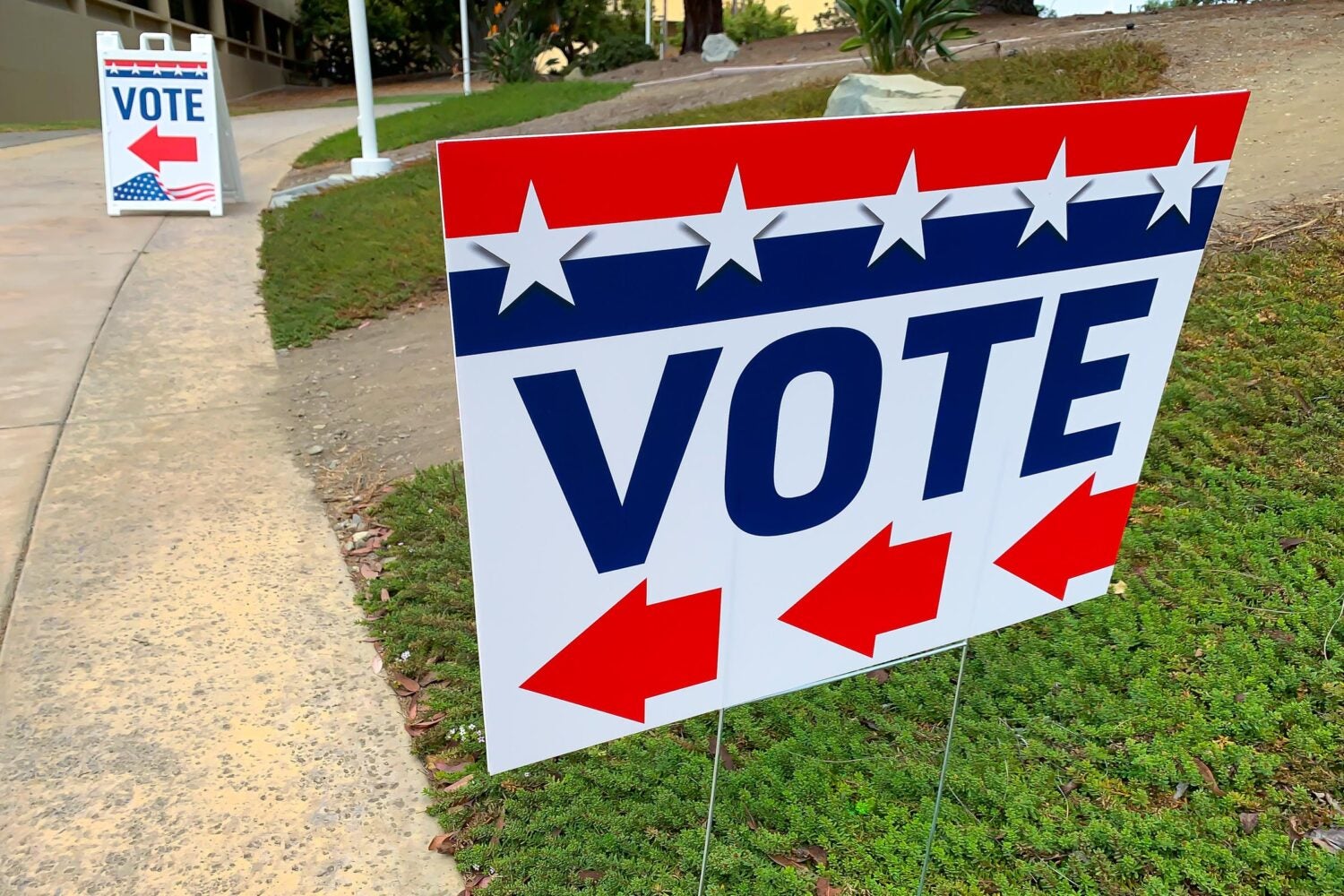Do you understand your voting rights?
For instance, did you know Harvard Law School students can vote in Massachusetts? Or that, technically, you shouldn’t snap a selfie with your ballot to share with friends — if it reveals who you voted for?
Unless you are new to planet Earth, you are probably aware that a United States election is fast approaching. On November 5, millions of Massachusetts residents will cast their vote for president and senator, along with other important races and state and local ballot measures.
New Bay State voters must register by October 26 to weigh in on this election, says Daniel Hessel, a clinical instructor in the Harvard Election Law Clinic. And everyone else, he adds, should check their registration status just to be sure they are ready for Election Day.
Empowering people, not politicians, is central to the Election Law Clinic’s mission, Hessel says. “We want to help communities and people have a greater and more accurate voice in their government.”
In an interview with Harvard Law Today, Hessel answered our burning questions about voting, including how you can cast your ballot, what to expect on Election Day, and what to do if you think your right to vote has been infringed.

Harvard Law Today: Who is eligible to vote in Massachusetts?
Daniel Hessel: Any resident of Massachusetts who’s a citizen and is over 18 is eligible to vote unless they are currently incarcerated for a felony conviction. But being eligible to vote is not enough: You have to actually register to vote. If you want to vote in this year’s election, you have to register by October 26 in Massachusetts. That date varies by state, so if you’re trying to register out of the state, it’s best to look at what your state requires. I think it’s important to note that those who are on parole and probation can vote as soon as they are free from incarceration in Massachusetts. Those who are in jail pre-trial, or for misdemeanors, can vote.
It’s also important to know that students who live in Massachusetts to attend Harvard or any other school can vote in Massachusetts, even if for the summers and school breaks they go back to a different state.
HLT: What are some of the ways Massachusetts differs from other states in its voting eligibility rules?
Hessel: The biggest difference is when it comes to voting by people who are in the criminal legal system. Some states permit everyone to vote, regardless of whether they’re currently incarcerated or not, but in far too many states, there is some sort of disenfranchisement of those with felony convictions. In some states, folks are permanently disenfranchised. In other states, they are subject to a really complicated and arbitrary process to restore voting rights. I think that’s probably the area where there are the biggest differences between states in terms of eligibility. But in Massachusetts, as long as you are not currently incarcerated for a felony conviction and meet all the other requirements, you’re allowed to vote.
HLT: How does one register to vote in Massachusetts? And where can Bay State citizens check to be sure they are registered?
Hessel: Massachusetts and every other state have online portals where you can check your status. There is online registration for Massachusetts, if you have a Massachusetts driver’s license or if the RMV otherwise has your signature on file. If you have an out of state license, you can print a form online and sign it and mail it in, or you can register in person at your local town clerk or Election Commission Office. Vote.org is also a great, reliable resource that allows you to check voter registration in any state.
HLT: You mentioned that students are allowed to vote in Massachusetts. If a student moved here from another state, do they need to do anything in their prior state before registering?
Hessel: No, you can register in Massachusetts right away. And as long as you don’t vote in both places, you should be okay. In some cases, you may see your name on the voter rolls in the place you used to be registered. That’s not a problem, as long as you don’t vote there.
“Students who live in Massachusetts to attend Harvard or any other school can vote in Massachusetts, even if for the summers and school breaks they go back to a different state.”
HLT: In what ways can someone cast their vote in Massachusetts?
Hessel: You can, of course, vote in person on Election Day at your polling place. There is also early in-person voting in Massachusetts, which this year is going to be from October 19 to November 1. I think it’s important to note that your early voting location is not necessarily going to be the same as your Election Day polling place, so it’s worth looking online or otherwise figuring out where you have to go to vote early. You can also apply for an absentee ballot, which should come by mail, and then you could either return it by putting it in the mailbox or in person at relevant government offices.
HLT: Are candidates or those canvassing for a cause allowed to approach someone if they’re waiting in line to vote on Election Day?
Hessel: People are not allowed to electioneer to you while you’re waiting in line to vote, in the polling place, and in Massachusetts, within 150 feet of the polling place, and that includes no posting of signs, and they can’t come up to you with a button for a candidate or ballot initiative. It’s meant to be a zone of reflection as folks decide how they want to vote, so you should not be approached by candidates or volunteers while waiting in line to vote.
HLT: Do voters have to show their driver’s license or ID when they vote in person? And if so, what happens if they forget it?
Hessel: Generally, you do not in Massachusetts, but there might be an exception if it’s your first time voting in Massachusetts, or if you are listed as an inactive voter, which is something you can check online. I think it’s important to note that it need not be a photo ID. If you have a recent utility bill or a lease with your name and address, that should suffice under Massachusetts law. But generally, you will not need an ID.
That said, if you show up to the polling place and you don’t have what you need, you can cast what’s called a “provisional ballot” and return with an ID later that day, before polls close. You should also be allowed to cast what’s called a “challenge ballot” if you don’t have access to an ID. A “challenge ballot” allows you to still vote, and a few more details go on the ballot, and then if there’s a recount, they might look at the challenge. But regardless of the situation, you should be able to cast some sort of ballot. If there’s any doubt and you have access to an ID or a utility bill, it’s probably best to bring it with you to avoid doubt.
HLT: Ballot selfies have become popular on social media in recent years. Are they legal in Massachusetts?
Hessel: This is something that varies state by state. In Massachusetts, you’re not allowed to do that under the letter of the law, if the selfie shows who you voted for. However, there is a court decision out of the First Circuit Court of Appeals, which includes Massachusetts, that casts doubt on whether that law is enforceable. I think it’s probably best to avoid it, or at least limit the picture to the parts of the ballot that don’t show who you voted for. If your goal is just to show people that you voted, there are a lot of ways to do a selfie that still complies with the letter of law.
“If your goal is just to show people that you voted, there are a lot of ways to do a selfie that still complies with the letter of law.”
HLT: What happens if I think my right to vote has been impinged?
Hessel: The Lawyers’ Committee for Civil Rights Under Law has a great, nonpartisan election protection service that it runs on Election Day and in the lead-up to the election to account for early voting. They train a lot of volunteer lawyers, many of whom speak Spanish and other languages, to answer questions people might have about voting or to take reports when there is a problem.
HLT: What are the most common problems that people run into when they’re trying to vote?
Hessel: I’d put these into two categories. First, I think it’s important in this context to talk again about the country’s system of felony disenfranchisement, which varies state by state. Second, and on a more granular level, election administration can be a little bit complicated. People can be taken off voter lists if they haven’t voted for a while, or if they don’t respond to mailings to their homes. It’s best, to avoid any problems, to just go online to Vote.org or the secretary of the Commonwealth’s website to double check that you’re registered and you’re active before going to the polling place to avoid Election Day problems. It’s also worth noting that polling locations change with every election, so even if you voted at your local school or your local church for the last 10 elections, it could be that for whatever reason in this election, your polling place is elsewhere. You can usually find that information online easily by entering your address, and I encourage people to check before Election Day.
HLT: What are the big picture issues you deal with in the Election Law Clinic?
Hessel: The Election Law Clinic is focused on empowering communities and people to have a greater and more accurate voice in their government. A lot of our focus, though not all of it, is at the local and municipal level. We litigate quite a few redistricting cases to ensure that communities, and in particular communities of color, have fair representation in local government and in state government. Ultimately, most of our cases are about empowering people, not politicians. And we also recognize that election law and voting rights are a racial justice issue in this country, and that attempts to suppress and disenfranchise folks do not fall equally along racial lines. There has been a concerted effort, for a very long time, to disenfranchise people of color or to dilute the power of their votes. Our focus is on stopping that where it’s happening and preventing it where possible through advocacy and litigation.
HLT: In your view, what should be done to shore up the right to vote in Massachusetts or around the country?
Hessel: Congress should pass the John R. Lewis Voting Rights Act amendments. It should not be understated how revolutionary that would be in ensuring the franchise. I think we also recognize the reality of how Congress works right now, and so there’s a movement in the face of that to pass state voting rights acts to expand the protections of the federal Voting Rights Act and to streamline enforcement. In the last six or seven years, quite a few states have passed state level voting rights acts, and the folks who live in those states have fantastic new protections that go beyond the Federal Voting Rights Act and make it easier for them to vindicate their rights. That includes expanded provisions to prevent vote dilution, and to expanded protections against vote denial and suppressive efforts and intimidation. Any state that’s serious about expanding its election administration in a voter-friendly way should look carefully at this.
Want to stay up to date with Harvard Law Today? Sign up for our weekly newsletter.
